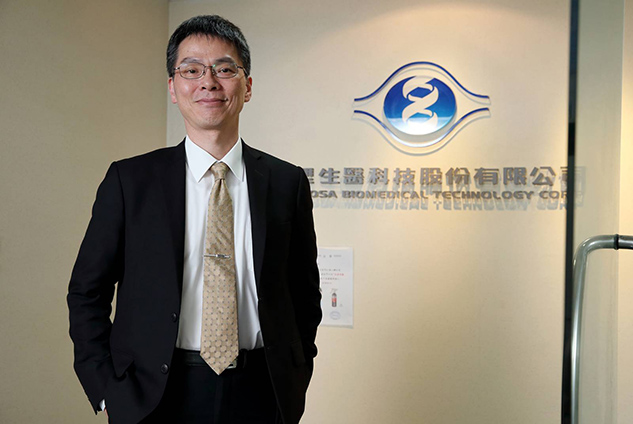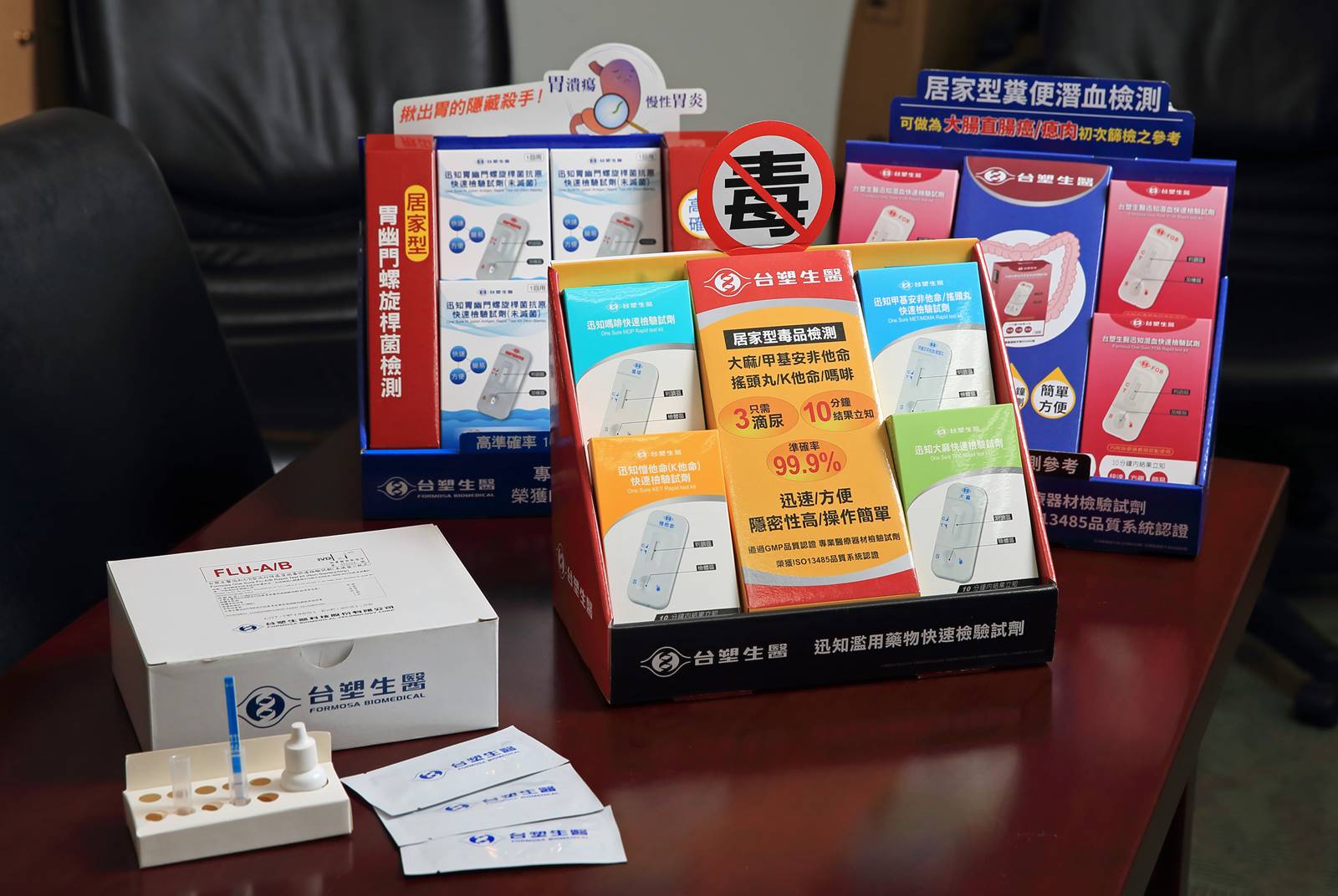One Rapid Test Kit Produced Every Second: Can Taiwan Provide COVID-19 Testing for Everyone?

Source:Chien-Tong Wang
South Korea was able to quickly get the COVID-19 pandemic under control through widespread testing of its citizens. They achieved this because they possess the capacity for mass production in the biotech industry. Taiwan also has a local king of test kit production. It has the potential to increase Taiwan’s testing capability by more than tenfold.
Views
One Rapid Test Kit Produced Every Second: Can Taiwan Provide COVID-19 Testing for Everyone?
By Cathy ChiangFrom CommonWealth Magazine (vol. 697 )
Whether Taiwan should test everyone for COVID-19, regardless of contact history, is an ongoing debate.
According to the New York Times, the key to how South Korea rapidly “flattened the curve” is its world-renowned testing capability. Around six hundred testing sites were erected across the nation. The daily testing capacity is nearly twenty thousand.
On the flip side, Taiwan’s testing capacity is far behind that of Korea, whether in terms of labs or medical professionals. Even the number of test kits is insufficient.
For citizens who wish to pay out of their own pockets to test for the coronavirus, can Taiwan become like South Korea and perform rapid tests like those used for influenza? They key may lie in a lakeside tourism factory in Yilan.
The Scenic Spot and the Test Kit Factory
Opposite the Longtan Lake Scenic Area (龍潭湖風景區) in Jiaoxi, Yilan, the Formosa Plastics Group (台塑集團) has built Taiwan’s biggest cluster of white shipping container houses. But few people know that the biotechnology arm of Formosa Plastics also has a test kit factory not far from there.
The Formosa Biomedical Technology Corporation (台塑生醫) is the largest test kit manufacturer in the country. Around half of the rapid test kits for influenza, and seventy percent of the pregnancy tests on the market, come from there. Besides products that carry their brand, many common over-the-counter drugs purchasable in any convenience store are also made by Formosa Biomedical Technology.

Photo by Chien-Tong Wang
Formosa Biomedical Technology is currently producing more than 500,000 test kits every month. Production can be stepped up to respond to a pandemic, raising the number to 1.5 million kits per month. “Whether it’s research and development or manufacturing capability, we are the most competitive company in Taiwan,” Liu Hui Chi (劉慧啟), Vice President of Formosa Biomedical Technology Corp., says.
Formosa Biomedical Technology is on Academia Sinica’s short list of rapid test kit manufacturers. Liu says that after successfully acquiring the technology and the critical raw materials, a prototype can be manufactured in under fourteen days.
Rapid test kits lack the accuracy of the nucleic acid tests currently used in Taiwan. But they are simple to use, so any doctor or clinic could operate them.
Formosa Biomedical Technology officially entered the medical test market in 2005. Unlike their more popular disinfectants and cleaning products, test kits are not currently their main source of revenue. However, Wang Ruey Yu (王瑞瑜), Chairperson of Formosa Biomedical Technology Corp., sees the potential in developing this product.
Carrying on Wang Yung-ching’s Legacy
“This is important for our society and our country,” says Liu. According to him, Wang Ruey Yu thinks the world will focus more on disease prevention in the wake of this pandemic of the century. This is a good chance for Taiwan to develop test kits, drugs, or vaccines.
Formosa Biomedical Technology’s venture in the medical test market turned it into one of Taiwan’s foremost test kit manufacturers. It is also closely connected to the ideals of Wang Yung-ching, founder of the Formosa Plastics Group.
A member of the Formosa Plastics Group reveals that test kits are necessary whether you are a healthy person trying to prevent a disease, or an ill person trying to diagnose your condition. As the founding Chairman of Formosa Biomedical Technology, Wang Yung-ching made sure Wang Ruey Yu consolidated the Group’s professional and academic medical knowledge, including research and development, production, and clinical testing and application.
Formosa Biomedical Technology invested NT$150 million in building clean rooms, semi-automated production equipment, etc. Now, they are able to produce one rapid test kit every second. “If we go in, we go all the way,” Liu relates Wang Ruey Yu’s management strategy.
These test kits are based on technology produced by the Department of Medical Biotechnology and Laboratory Science and the Research Center for Emerging Viral Infections at Chang Gung University. Formosa Biomedical Technology optimized the mass production process, and Chang Gung Memorial Hospital carried out clinical testing and application. Together, they provided an industry-leading one-stop solution that includes research, development, and mass production.
The Key to Mass Producing Rapid Test Kits
A biotech professional reveals that Formosa Biomedical Technology benefits from having a “rich dad”. The amount of money they pour into test kit production is more than ten times that of small- and medium-sized enterprises. Aggressive procurement of automated production equipment helped to ramp up production capacity to the most optimal levels.
The two keys to making a good test kit are the critical raw materials and the craftsmanship involved. Liu says that, so long as you find the right materials, the precision and accuracy of the test kit will be spot on. Professional test kit manufacturers can go a step further to optimize the product, maintain the quality, and extend its shelf life.
The most important step in the manufacturing process of the rapid test kits is the production of paper test strips.
Hung Tsang Lung (洪滄隆), Plant Manager of Formosa Biomedical Technology Corp., says that after the raw material is acquired, it must be optimized through a certain production process, and then applied to the paper test strips. How to improve accuracy and reduce interference depends on the technology platforms developed by individual companies.
The key to mass production is how you manufacture the paper test strips. Jerry Tsai (蔡維仁), Vice President of the Department of Rapid Detection Careers at AsianGen Corporation, brings up the fact that a buffer solution needs to be added to the raw material. But the laboratories that invented the technology may not have taken the formula into consideration. In the past, successful tests in the labs may have only had a shelf life of a couple months, or a matter of days. Formulas used in production plants usually need to pass tests for quality and stability.
But the mass production of rapid test kits involves more than research, development, and manufacturing. Liu reveals that applying to the government to get the test kits approved takes the most time. Fortunately, the Taiwan Food and Drug Administration (食藥署) will use the Emergency Use Authorization (EUA) provision. Hopefully, this will speed up the test kits’ time to market.
The South Korean government moved quickly. What about Taiwan?
The Korean government was very proactive in their approach to COVID-19 testing. As early as February 4th, the government gave the go-ahead for biotech companies Kogene and Seegene to produce nucleic acid tests. At the time, there were only 16 confirmed cases in Korea. Four different tests were approved in one month. This allowed for the establishment of “drive-through” testing sites and mass testing for everyone.
“We stamped our feet when we saw that,” says Johnsee Lee (李鍾熙), Chairman of Taiwan Bio Industry Organization (台灣生物產業協會). In addition to domestic use, test kits manufactured by Korean biotech firms ended up being exported to Europe and Japan. At the same time, Taiwan dragged its feet because it was afraid of appearing to line the pockets of private companies.
Taiwan’s Pharmaceutical Affairs Act (藥事法) adopted the Emergency Use Authorization (EUA) provision in 2015. The COVID-19 pandemic is the first time it has been put into action. According to Researcher Wang Chao-I (王兆儀) of the Taiwan Food and Drug Administration, it takes 220 days for standard medical equipment to pass the application process and appear on the market. The EUA provision shortens the waiting period to thirty days. But it is only applicable to periods of time when the Central Epidemic Command Center (中央流行疫情指揮中心) has been activated.
A country’s ability to combat a disease lies ultimately within the private sector. Lee says that while Taiwan has done a good job of preventing an outbreak, in the long term, it needs to produce its own tests, drugs, and vaccines. The only way to mass- produce these necessities is through private companies.
“The disease prevention industry is long-term preparation for a battle you hope will never come,” says Lee. Private companies should be involved from the start. Regulations also need to be lifted to accommodate their involvement.
No one can predict the course of a pandemic. He believes the government should guarantee purchase of these medical products so corporations can invest in them with an easy mind.
Have you read?
♦ The Taiwan lab at the heart of the COVID-19 fight
♦ An ‘AI Stethoscope’ that Is Outfoxing COVID-19
♦ Sensory Loss Used to Screen for Hidden Coronavirus Infections
♦ Remdesivir a Cure for COVID-19? Taiwanese doctors: Not so Fast
♦ How Taiwan Fights COVID-19: Secret Weapons from the SARS Experience
Translated by Jack Chou
Edited by TC Lin
Uploaded by Judy Lu






